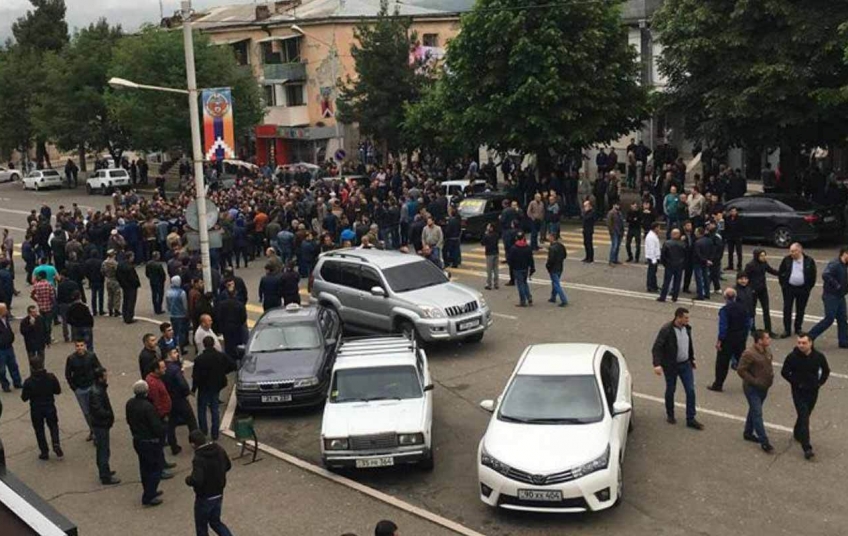The change of power that took place in Armenia in a revolutionary way could not but affect the internal situation in Artsakh. Very soon people in the streets demanded a fair attitude to themselves and ... "heads" of high-ranking officials flew. The President of Artsakh Bako Sahakyan did not make any statement about this. Apparently, he decided that everything was clear to everyone. The protesting citizens also did not particularly rejoice - evidently, no one considered that the president had done them a favor. Most likely, everyone thought that Bako Sahakyan would not dare to ignore the demand of people requiring a fair treatment.
At first glance it seems that nothing remarkable has happened in Artsakh - ordinary personnel reshuffles. But it only seems so. In fact, in early June, the end was put to a quarter century of injustice policy towards the Armenian people: The policy, which was based on the usurpation of the rights of the people fighting for their freedom. Once, immediately after the victory in the war, someone decided to usurp this victory, to usurp the glory of the heroes of the war and to deprive the people of the right to freedom. Everyone in Artsakh knows this well. But few outside Artsakh comprehend the whole depth of this crime against the people.
Today in Yerevan a group of people persistently demands the release of the convicted Samvel Babayan. At the same time, the main argument of the demand is that the figure, who has the Medal of Hero of Artsakh was condemned by the former regime of Armenia for political activities. So it is - Babayan was isolated by his former colleagues because of his attempts to return to politics. In reality, showdown continues, having a long history in the triangle of relations between Serge Sargsyan-Samvel Babayan-Arkady Ghukasyan. At the heart of the showdown is the sharing and redistribution of personal power. All three of them hanged the Medal of Heroes of Artsakh. All three in different years were formal or informal leaders of the military-political regime in Artsakh. There were others, for example, Robert Kocharyan, Bako Sahakyan - who are currently out of the above-mentioned quarrels.
Is it interesting to the society of Armenia and Artsakh? It should be interesting only from the point of view that all these figures are the main link of those same usurpers of the glory of the heroes of the Karabakh war who used this usurped glory to suppress the free will of the heroic people. These figures, with external support, suppressed the legitimate authority elected in 1992 in Artsakh, and after the war they established a military dictatorship. Very quickly, Samvel Babayan, who was in command of the Karabakh army, turned this regime into a military criminal dictatorship, driving Kocharyan and Sargsyan out of Artsakh. The country was rooted in criminal lawlessness. The change of power in Armenia in 1998 and the subsequent death of Vazgen Sargsyan allowed the toppling of the regime of Samvel Babayan and temporarily protect the people of Artsakh from lawlessness. However, the head of NKR Arkady Ghukasyan treated Babayan with "special reverence" and very soon restored the dictatorship in its soft form. True, his dreams of making his power lifelong through the adoption of the constitution and attempts to go for a third term failed with a bang.
Bako Sahakyan, who appeared in the political arena in 2007 as a single candidate for the post of NKR President (the only one who did not have the medal of the hero of Artsakh on his chest), treated Samvel Babayan’s staff with even more respect by placing them in the highest positions and protecting their activities with even greater guarantees. The atmosphere of lawlessness returned to the period of the 1990s. The country was divided into a caste of privileged usurpers and a deprived and enslaved people. One got jeeps and palaces, others - coffins and prison cells.
But times change: Sahakyan was not destined to perpetuate this regime. On the contrary, it was destined to begin the process of dismantling this anti-human machine and withdraw key members of the caste from the system of state administration. Torn off from the protection of official Yerevan, this caste quickly gave up at a time when the people said: "Enough - we demand justice." The quarter-century era of injustice has come to an end.
It only remains to add that the current politicians, who continue to play the slogan of "persecution of heroes" by inertia, should think carefully over who and what they want to revive in Armenia and Artsakh? Moreover, it is worth pondering for those who wish to whitewash and rehabilitate this group of people responsible for the unfair treatment of the nation.





